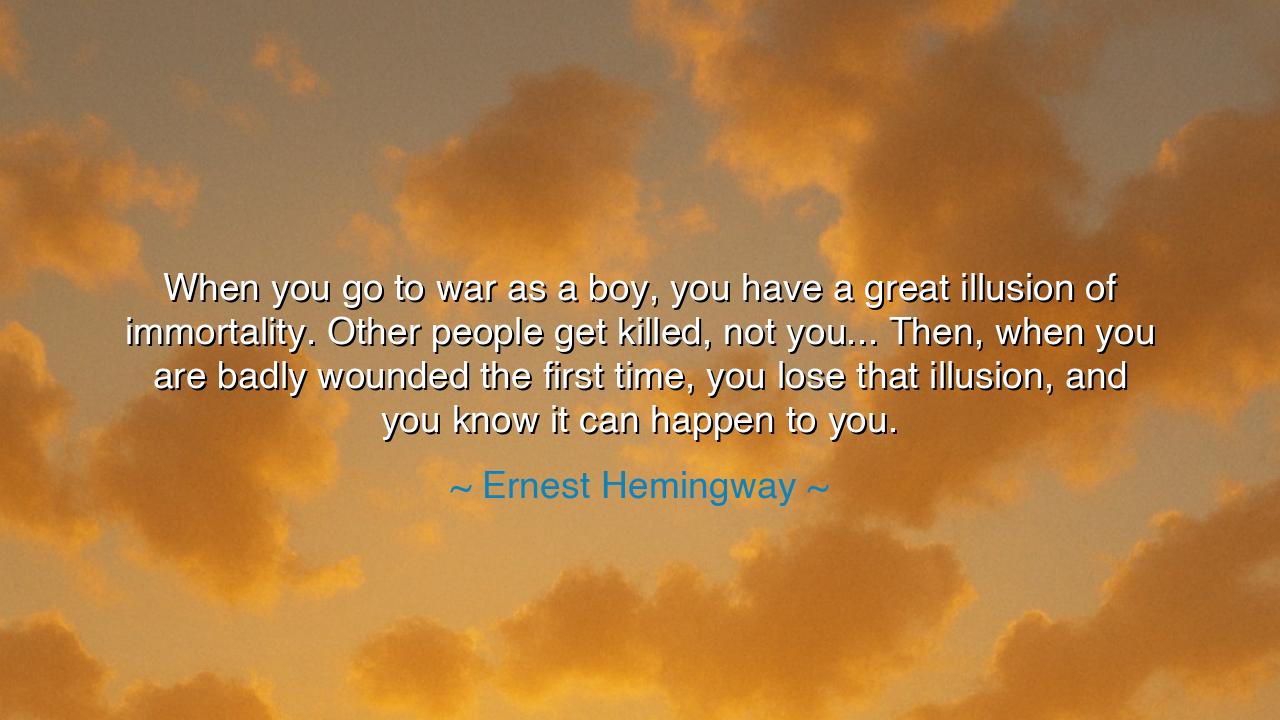
When you go to war as a boy, you have a great illusion of
When you go to war as a boy, you have a great illusion of immortality. Other people get killed, not you... Then, when you are badly wounded the first time, you lose that illusion, and you know it can happen to you.






Hearken, O seeker of understanding, to the profound meditation of Ernest Hemingway, who spoke thus: “When you go to war as a boy, you have a great illusion of immortality. Other people get killed, not you... Then, when you are badly wounded the first time, you lose that illusion, and you know it can happen to you.” In these words lies a timeless reflection upon the fragility of life, the awakening of mortality, and the passage from youthful bravado to the sobering wisdom of experience. Hemingway’s insight reminds us that the human spirit, though bold in imagination, must one day confront the stark truths of existence.
In the days of old, the young warrior often marched to battle with the fire of imagined invincibility. Homer’s heroes strode across the plains of Troy, fearless in the glow of glory, believing themselves untouched by death’s shadow. Yet even Achilles, mighty among men, was fated to fall, reminding us that youthful illusions of immortality are fragile against the inexorable tide of reality. Hemingway’s reflection is of the same spirit: the first wound, the first brush with the abyss, strips away illusions and lays bare the truth that life is precious, fleeting, and uncertain.
The story of Hemingway himself, who served as an ambulance driver in the Great War and witnessed the carnage of battle firsthand, illustrates this revelation vividly. The young soldier, full of daring, confronts death from afar — observing the fallen, believing that he alone will escape its grasp. Yet when the first injury strikes, it is not merely the body that suffers, but the spirit. The veil of invulnerability is torn, leaving the warrior to face the knowledge that life is not guaranteed, that mortality touches all alike, and that courage must now be tempered by wisdom.
This understanding resonates with the lives of countless warriors across history. Consider the Roman legionaries, whose youthful vigor carried them into campaigns across distant lands. Many believed in their own invincibility, only to learn through wounds and loss that survival is never certain. In that instant, a transformation occurs: bravery is no longer reckless, and every action is informed by the awareness that death is always near. Hemingway captures this eternal truth: knowledge of one’s mortality transforms the soul, teaching vigilance, humility, and reverence for life.
Yet within this realization lies a hidden virtue: the awakening to self-awareness and the preciousness of existence. The boy who believed himself immortal is now a man who understands consequence, who treasures each moment, and who moves through the world with deliberate courage. In literature, history, and life, the first encounter with mortal danger is a rite of passage — a shaping fire that molds character, empathy, and wisdom. The warrior learns that fear and respect for life do not diminish bravery, but refine it.
From this reflection emerges a lesson for all mortals: the recognition of vulnerability is not weakness, but enlightenment. Just as Hemingway observed in war, each of us will face moments when our illusion of control and invulnerability is shattered — whether through illness, accident, or loss. In these moments, one gains clarity, understanding that courage is measured not by ignorance of danger, but by the choice to act despite it. Life’s fragility calls for awareness, humility, and valor.
Practical counsel flows from this timeless wisdom. Embrace life fully, yet acknowledge its uncertainties. Do not flee from challenges, but meet them with preparation and mindfulness. Cultivate strength, yes, but temper it with reflection, knowing that awareness of your own mortality deepens character. Hemingway teaches that true courage arises from the union of action and insight, and that every wound, every trial, is a teacher in the sacred school of life.
Thus, O listener, let these words guide your journey: confront the illusions that shelter youth, face adversity with heart, and carry the knowledge of mortality as both shield and compass. In doing so, you walk not in fear, but in enlightened bravery, embracing the fleeting gift of existence with wisdom, courage, and the profound recognition that life is to be lived fully, even in the shadow of death.






AAdministratorAdministrator
Welcome, honored guests. Please leave a comment, we will respond soon